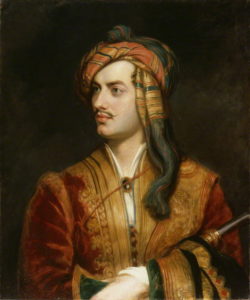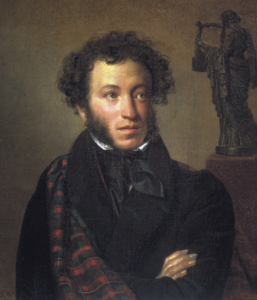バイロン『マンフレッド』あらすじと感想~「バイロン的」とは?プーシキンの『オネーギン』とのつながり

イギリス詩人バイロンの代表作『マンフレッド』~「バイロン的」ってどういうこと?プーシキンの『オネーギン』とのつながり
前回の記事ではプーシキンの代表作『エウゲーニイ・オネーギン』を見ていきました。

もう一度表紙のあらすじを見ていきましょう。
純情可憐な少女タチヤーナの切々たる恋情を無残にも踏みにじったオネーギン。彼は後にタチヤーナへの愛に目覚めるが、時すでに遅く、ついに彼の愛が受け入れられることはなかった……。バイロン的な主人公オネーギンは、ロシア文学に特徴的な〈余計者〉の原型となった。ロシア文学史上に燦然と輝く韻文小説の金字塔。散文訳。
Amazon商品紹介ページより
この前の記事でもお話ししましたがやはりこの「バイロン的」というのがわかりにくいですよね。というわけで岩波文庫版プーシキン『スペードの女王・ベールキン物語』にこの言葉の解説がありますので続けて引用します。
バイロンの歌はいわば、ナポレオン没落後の西欧という血なまぐさい焦土の中空を、かすめて過ぎた魔鳥の羽ばたきである。おそらくその正体を深く見きわめた者は、当時としては誰もなかったはずであるが、それだけにまたその不気味な羽ばたきのうちに、人々が思い思いの烈しい感銘を汲みとったことは事実であった。特にロシヤでは、それはバイロニズムと呼ばれて、滔々たるロマンティシズムの風潮全般を優に蔽いつくす大きな呼び名とさえなるに至った。宿命への反逆、悪魔的なまでの自我至上主義、社会的因襲からの脱出の当然の帰結としての異国趣味(より的確にいえば東邦趣味)などは、もちろんその基本的な特徴にちがいなかったが、とりわけロシヤにおけるバイロニズムの大きな特質は、それが多年にわたる政治的抑鬱を吹きとばす革新の原理として、あの十二月党の運動と具体的に結びついた点にあった。実際この秘密結社の指導的地位にあった青年将校たちにして、多かれ少なかれバイロンの心酔者でないものは一人もなかったと言っていい。そしてプーシキンにたいするバイロンの影響の性質も、決してその例外ではなかった。
プーシキン『スペードの女王・ベールキン物語』神西清訳 岩波文庫P268
ドストエフスキーも若かりし頃バイロンを読んでいます。ですがこれはプーシキンの時代にも遡る現象だったのですね。イングランドの詩人バイロンがロシア文学者に与えた影響も興味深いです。
というわけで今回の記事では実際にイギリスの詩人バイロンの代表作『マンフレッド』を題材に「バイロン的」と呼ばれるものについて考えていきたいと思います。
イギリスの詩人バイロンの代表作『マンフレッド』

『マンフレッド』はイギリスの詩人バイロンによって1817年に出版、1824年に初演された作品です。後にシューマンやチャイコフスキーによって音楽化もされた作品です。
私が読んだのは岩波書店、小川和夫訳の『マンフレッド』です。
早速巻末の解説を見ていきましょう。
『マンフレッド』は三幕十場より成る。場面はアルプス山中、主人公はマンフレッドという中世のアルプス山地の城主である。
劇は、主人公の深夜の独白にはじまる。『ファウスト』の冒頭との類似がいちじるしいがファウストの歎きが人間の知識の無力に対するものであったのに比して、マンフレッドの歎きは自己の性格の分析による絶望なのであって、『マンフレッド』が自我の文学であることは、最初のこの独白において早くも明瞭に示されている。
たとえおれが仮睡もうと―そのまどろみは眠りではない、
絶えぬ思いのその続きで、
まどろみのうちにも断ちきりようがないのだ。おれの心は
夜を徹して目覚めていて、この両の眼が閉じるのも
ただ内にあるものを眺めるためなのだ。この人はたえず目覚めていなければならぬ嘆き、常に内なるものに目を注いでいなければならぬ苦しみを感じている。すなわち自意識の苦しみにほかならない。
この苦しみはどこから来たのであろうか。それは彼の知識から来たのである。「哲学や科学や驚異の源泉や世界の叡智や」およそ彼の試して我がものとした知識から来たのである。マンフレッドは中世の貴族であるが、本質においては近代のインテリゲンチャなのであり、「智慧の樹はついに生命の樹ではなかった」というあの近代人共通の悩みを告白しているのだ。
その結果彼は自意識的となる。たえずおのれに憑かれ、たえずおのれを見つめている苦痛を感ずるばかりでない、「善も、悪も、生命も、力も、情熱も、」彼にとっては「砂地に降る雨に等しくなった」のである。なぜならば、非情な分析のみをこととする知性は、いかなる対象の価値づけも行わぬであろうから。したがってすべての対象は同価値、というより、無価値になってしまうであろうから。ものや事に価値を附するものは知性とは全然べつな、非合理的な心の働きなのであるが、分析的な知性が過度になると、このような心の働きを殺してしまうのである。マンフレッドはすでにこのような自然の感情の喪失に悩んでいる。
岩波書店、バイロン『マンフレッド』小川和夫訳P108-109
『マンフレッド』の物語はアルプスの山々が舞台となっていて、主人公のマンフレッドは自我の意識に苦しむ貴族。彼は何をしても、何をもってしても何も感じない、心の砂漠を抱えた人物です。
すべては無価値。善も悪もない。既存の秩序も何の救いももたらさない。頼るべきものが何もない。そんな宙ぶらりんの状態です。
そんな彼が精霊たちに「干からびてしまった自らの生」を、「無感動となってしまった自我」への嘆きを吐露するところから物語は始まっていきます。
マンフレッドの心の砂漠は彼の成長につれて徐々に形成されていったのだが、それに一挙に最後の仕上げを与えたのは、恋人の死である。この「名状すべからざる時」以来、彼は自然の感情を全く喪失してしまったのであった。それまで恋人に対する情熱が、彼を非人間的な意識家に化することをわずかに防いでいたのである。
しかしこの恋は「道に違うた恋」であった。恋人たるアスターティは顔貌が彼に生写しで、彼の愛してはならぬ間柄にあったのである。(中略)マンフレッドの抱擁はアスターティにとって「致命の毒」だったのであり、どのようなふうにであるかは明らかにされていないが、アスターティは死んでしまうのである。
他のすべての自然の感情を感じなくなっている彼に、ただひとつ残っているのは、亡き恋人に対する思慕の情であり、また自分の愛によって恋人を破滅させてしまったのだという罪の意識である。
自意識の悩みと罪の意識と―この二つを等しく同時に解決するものとして、マンフレッドが精霊たちに求めたものは「自己忘却」であったのは当然である。後年になって多くの自意識家たちもまた懸命に「自己忘却」の道を発見しようと苦労して、やはり失敗している。「たえず酔っていなければならない、酒であれ、女であれ、徳であれ」とポードレールも自分にいいきかせている。
精霊たちは「忘却」を与えることができない。それ以外のものなら、地上を支配する力でも王国でも主権でも与えることができるのだが、「忘却」だけは彼らの力に及ばないのである。マンフレッドは、「自己忘却」さえ得られれば、死んでもかまわぬと思っている、生は苦悩にすぎないのであるから。しかし精霊たちは彼に死を与えることはできない。
岩波書店、バイロン『マンフレッド』小川和夫訳P108-109
人間は自意識に苦しみます。そして罪の意識にも。
ボードレールの「たえず酔っていなければならない、酒であれ、女であれ、徳であれ」という指摘は非常に鋭いものであるように感じます。
そこから逃れるには「忘却」しか残されていない。しかし忘却は人間には許されたことではないのです。ここに終わりのない苦しみが横たわっているのです。
第二場はアルプスの高峰ユングフラウの朝である。断崖の上に立ったマンフレッドは、朝日に輝いた美しい自然を讃美するが、この美しい自然も彼の苦悩を休めてはくれない。
ああ、母なる大地よ!
そして昧爽の日よ、また、おまえたち山々よ
なぜにおまえたちはこうも美しいのか。おれには好きにはなれない。自然への讃美はこの劇詩のところどころに点綴されてあって、それには朗々誦すべき詞句が少くない。マンフレッドによれば(そしてバイロンによれば)、自然は人間よりも親しみ深いのであり、人間界よりの逃避の場所である。
星はきらめき、雪の輝いている
山々の頂きに月はのぼった。―ああ、なんという美しさだ!
自然とはまだ名残惜しくて別れられぬ、なにせおれにとっては
いまこそ人間の顔よりも「夜」の顔の方が
親しみぶかかったのだからなあ。(第三幕四場)マンフレッドは断崖から身を躍らせてひと思いに死にたいと考えるが、「なにか引き止める力が働いていて」、彼を「あくまで生きさせようとする」。あの呪縛の力が働いているのである。躊嘩しているうちに、彼は狩人に抱きとめられる。
岩波書店、バイロン『マンフレッド』小川和夫訳P112
マンフレッドは圧倒的な自然の美しさに気づいてはいるものの、好きにはなれないと言います。美しい自然も彼の心を癒すことはできなかったのです。
ですが彼にとっては人間よりも自然の方が親しみやすく、一思いにその自然に身を投じて死のうとします。
しかし、「なにか引き止める力が働いて」、彼を「あくまで生きさせようと」します。あの呪縛の力が働いているのであります。
私はこの箇所を読んでふと『カラマーゾフの兄弟』の「粘っこい若葉」を思い出しました。

これはカラマーゾフ家の次男イワンが言った言葉です。彼はまさしく頭が良く、理性的で自意識の病に苦しむ人間です。あの「大審問官の章」を考え出したのもこのイワンです。そんな彼がこう言うのです。
かりに俺が人生を信じないで、愛する女性にも幻滅し、世の中の秩序に幻滅し、それどころか、すべては無秩序な呪わしい、おそらくは悪魔的な混沌なのだと確信して、たとえ人間的な幻滅のあらゆる恐ろしさに打ちのめされたとしても、それでもやはり生きていきたいし、いったんこの大杯に口をつけた以上、すっかり飲み干すまでは口を離すものか!こう言いきかせていたのさ。(中略)
俺の内部のこの狂おしい、不謹慎とさえ言えるかもしれぬような人生への渇望を打ち負かすほどの絶望が、はたしてこの世界にあるだろうか。そして、どうやらそんなものはないらしいと、結論したのさ。(中略)
こういう人生への渇望を、往々にしてそこらの肺病やみで洟ったらしのモラリストたちは、卑しいものと名づけている。特に詩人なんて連中がな。こいつはある意味でカラマーゾフ的な一面なんだよ、それは確かだ。この人生への渇望ってやつはな。だれが何と言おうと、そいつはお前の内部にも必ず巣食っているにちがいないんだ。しかし、なぜそれが卑しいものなんだい?このわれわれの惑星の上には、求心力はまだまだ恐ろしくたくさんあるんだものな、アリョーシャ。生きていたいよ、だから俺は論理に反してでも生きているのさ。たとえこの世の秩序を信じないにせよ、俺にとっちゃ、≪春先に萌え出る粘っこい若葉≫(訳注 プーシキンの詩『まだ冷たい風が吹く』から)が貴重なんだ。青い空が貴重なんだよ。そうなんだ、ときにどこがいいのかわからずに好きになってしまう、そんな相手が大切なんだよ。
ドストエフスキー『カラマーゾフの兄弟 上』原卓也訳 新潮社P576-577
俺が泣くのは絶望からじゃなく、自分の流した涙によって幸福になるからにすぎないんだよ。自分の感動に酔うわけだ。春先の粘っこい若葉や、青い空を、俺は愛してるんだよ、そうなんだ!この場合、知性も論理もありゃしない。本心から、腹の底から愛しちまうんだな、若い最初の自分の力を愛しまうんだよ。
ドストエフスキー『カラマーゾフの兄弟 上』原卓也訳 新潮社P578
知性も論理も越えた生命そのもの!春先の粘っこい若葉が人間を生かす。
死を選ぼうとしたマンフレッドも、彼を「あくまで生きさせようとする」あの呪縛の力が働いていたが故に自殺を踏みとどまるのです。
ただ、マンフレッドの悲しさはそれでもなお救われないというところにあります。いや、むしろ死ねないからこそその苦しみが無限に続くように感じられ、さらに苦しむことになってしまったのです。
そしてイワンもどうしようもない自意識と罪の意識にさいなまれ苦悩していくことになる点もどこかバイロン的なものを感じさせます。
マンフレッドとイワンには直接の連続性はありませんが、こうして見てみますとバイロン→プーシキン→ドストエフスキーというバイロン的なるもののつながりが何となく見えるような気がしてこないでしょうか。
『マンフレッド』は近代自我の悲劇であり、そのような作品群の先駆的位置を占めながら、なお十分に主題を展開し得ている。彼につづく十九世紀の多くの作家たちは、バイロンの提出したこの間題をあらためて自ら悩まねばならなかったし、その解決のために苦しまねばならなかった。
バイロン自身もこの主題をこれだけで放棄したのではない。善と悪との問題、何故に人間はこのような苦しみにおかれねばならぬかという問題、かかる問題にたいするキリスト教の教義にたいする批評、―後年バイロンはそのような点について更に一歩前進して探究することになる。
岩波書店、バイロン『マンフレッド』小川和夫訳P121
バイロンは後の作家たちに多大な影響を与えました。プーシキンもその一人です。
そしてそのプーシキンを深く敬愛していたドストエフスキーもバイロンを読み込み、そして『オネーギン』を通してバイロン的なるものへの思索を深めていったのでありました。
こうして考えてみると改めて、あらゆるものは繋がっているのだなと感じさせられました。
『マンフレッド』は近代人の自我の悩みを描いた古典中の古典です。その迫力は今でも色あせないものがあると感じました。言っていることに全然古さを感じさせないです。
そういった意味でもとても面白い作品でした。
以上、「バイロン『マンフレッド』あらすじ解説~「バイロン的」とは?プーシキンの『オネーギン』とのつながり」でした。
Amazon商品ページはこちら↓
次の記事はこちら

前の記事はこちら

関連記事















コメント